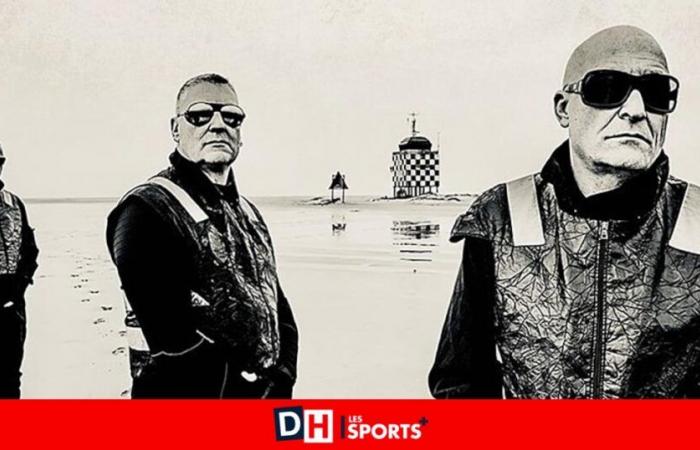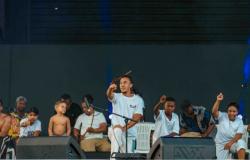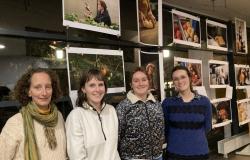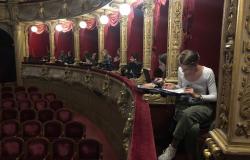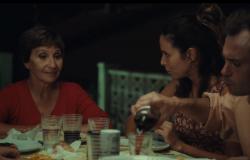How are you feeling heading into these last three concerts?
“Personally, I’m very happy. It’s perhaps not the same feeling among my comrades but for me, I’ve been a little fed up with it for a while. We’re not going to continue doing that all the time I’ve seen too many groups, artists for whom I had respect go too far, make too many albums or almost completely die on stage when their doctor should have told them to stay home. them We must leave with our heads held high, leaving them. good memory. Our type of music is electronic body music. There is the term ‘body’ in it. If we are no longer able to move on stage as we should, to give the right energy visually, in a way. physically, it no longer makes sense.”
Yet on stage, things always move a lot. I was able to see him at OM, at Seraing…
“We always enjoy doing that. They remain special moments. Because ultimately, in our career, we haven’t done many concerts. Less than 900 in more than 40 years of existence. That’s a little more around twenty per year. We cannot say that we have saturated the market.”
Front 242 at OM in Seraing: winner by KO in the last round
Is it a regret not to have done more of a scene?
“No. We had a lot of failures and made a lot of mistakes but overall, I’m relatively happy with the way we did things.”
What mistakes have you made?
“Full. Really a lot! For a very long time, we didn’t work with the right people. We are still in total disagreement with our historic record company Play It Again Sam, which for us has never respected the terms of the contract. They underpaid us. We are in a lawsuit with them, even if it will never amount to anything. We should never have signed with Sony in the United States. We could have put our egos aside and done two or three. three more albums but we never fell agree on the artistic modalities… At the same time, if Front 242 lasted so long, it is because we managed to overcome these errors and decided to continue without making compromises or, in any case , to limit them as much as possible, and therefore to be in agreement with what we were doing. Other groups would have said ‘it’s over’.”
Not making compromises, hasn’t that blocked your access to the general public when you are cited by many big groups as a source of inspiration?
“Access to the general public has never been a priority. We never had the ambition to become popular. We never said to ourselves that we absolutely had to do Forest National, etc. C It was us in relation to us. If it sells, that’s good. If it sells less, that’s good too. We had one foot in the completely alternative. it’s a little bit commercial or mainstream. It’s never been for us. embarrassed. I am proud to say that our career has not made us rich, but it has allowed us to live well.
However, you had everything to become a very famous group. You signed in the United States in the mid-80s, on the Wax Trax label. You even played at Lollapalooza, the big American festival…
“We were the black sheep there. We were the only European group and the only electronic group. We were really the intruders. I remember when we played there, they put us two kilometers from the stage main, in a trailer which was at the end of the property If possible next to the toilet drains. They scheduled us but we really had the impression that we were not part of the same family. “
You also opened for Depeche Mode in the heyday. It’s not nothing. And they cited you quite a bit as a source of inspiration…
“It’s huge, yes. It’s quite rewarding but it wasn’t the objective at the start. It’s true that we got along very well with them. There were very precise instructions (during the tour, Editor’s note), because we were really small and they were already huge at that time. We worked as professionally as was necessary, respecting the instructions, having. a lot of consideration for the group. got along well with them. These are things that stand out. I think they were people who didn’t expect the success they had either. They kept, despite their gigantic success, a side. simple, accessible, let’s say a good-natured and touching side. I met people much less famous than them who thought they were stars and who were much more haughty, even frankly undrinkable.”
What was the DNA of Front 242 when it was created?
-“Making records with noise from new machines. It was about breaking away from Anglo-Saxon clichés. We had just left a period of progressive rock which bored us deeply. A few years before, there had been the punk wave. We said to ourselves that it would be good to combine punk energy with noise to make songs. Over the 40 years of our career, this DNA has evolved a little, because musical tastes change. choruses and melodies. We’ve also calmed down a bit, but the initial flame is still there. It’s not common to hold on for so long. are not musicians. We don’t know how to do anything else. I tried to work with people of the French variety and it never worked. Same for the others who worked on things a little more distant. Somehow, we are limited by our own technical limitations. and emotional on a musical level. It’s very good. It’s a pride to have been a kind of pioneer and this kind of unique entity. We cultivated this because initially in any case, three out of four members of the group are rather asocial type people, who are both relatively open to the outside world but who try to preserve themselves at the same time. We agreed on that. We promised each other almost from the beginning that we would never become social, I think we kept that well.”
What memory of this career remains engraved in your mind?
“It’s not spectacular but it’s the first or second time we played at Plan K (in Brussels, Editor’s note). It was a legendary venue but there was no dressing room behind the stage So we had to change on another floor and to get on stage, we had to cross the audience from the back. When we started the music, with no one on stage, we realized that there were 200 or so. 300 people in the front rows who already knew the words and were busy shouting them before we were on stage yet. It was the first time we realized that we were starting to have popular success.
You were also pioneers in terms of visuals, with the use of images during concerts, all the pixelated graphics, your work with the photographer Anton Corbijn who directed the video for “Headhunter”…
“Yes, we were lucky that in the group, out of four members, we had two who came from graphic arts. This is also one of the elements that allowed this group to remain independent. We had enough resources and talents to create our own images, at least for the cover or for the t-shirts. When you start a career in a field, it’s never wasted. It made us independent.
I remember a concert in Louvain-la-Neuve, at the end of the 80s, which didn’t last very long because the stage collapsed under pressure from the fans…
“Sorry to say it but the organizer was an amateur. The stage was almost trestles with planks on top. It should never have been allowed. We were lucky it was the central part which collapsed and not the one on which we had our instruments. If the instruments had fallen, they would have been destroyed and we would never have been able to do the tour since it was the first concert. Our career would probably have ended there. , because our equipment and instruments were not insured. They had cost us extremely expensive. We had scraped the bottom of our drawers to buy them.
Front 242: “What saved us all these years was live”
The scene is over, no going back possible?
“For me it’s completely out of the question. I’m almost 70 years old. I don’t want to stop for three years and then start again only to realize that we no longer have the level. That’s a bit of me who pushed for us to stop. My comrades would have continued for a few more years, but I think they realized during this last tour that it’s the right time. even small physical glitches that accumulate, the fact that the general conditions of concerts, over the years, have deteriorated considerably. Everything has become excessively commercialized.
The concerts are over. And the records?
“We have new songs, some of which we’re playing on stage. I don’t know what we’re going to do. There’s no specific plan. The important thing is first to rest to to get my head out of what has been constant pressure for decades. I see it as a liberation. I have already bought lots of tickets, made lots of reservations in hotels to see small groups, plays. theater, events it’s a luxury that I didn’t have. not allowed for a very long time.”
Was ending Front 242’s stage career at Ancienne Belgique necessary?
“Yes. I think it will be our concerts number 16, 17 and 18 at AB. It is the hall in which we have played the most often in the world. It is also considered by musicians all over the world as one of the three best venues in the world and I think it’s entirely justified. I always laughed when we were told that the public communicates with the group, that the group feels the power of the public and then that it gives it back. . I, I I’ve never felt anything like it except once, at AB. That time, I said to myself ‘ah yes, that’s really it. only place in the world where I felt that for three or four seconds. It’s already better than nothing.”

